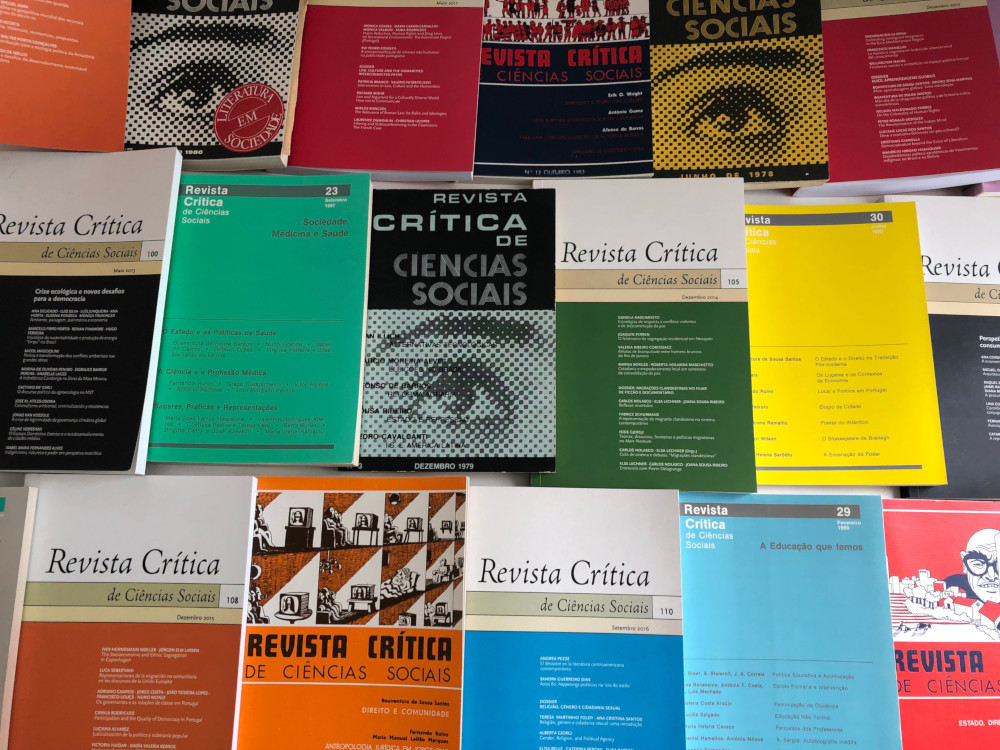Prémio
Prémio Revista Crítica de Ciências Sociais atribuído ex æquo
29 de junho de 2022
Coletivos teatrais enquanto organizações emancipatórias e análise sociopsicológica de declarações de gestores de empresas públicas em Comissão de Inquérito são os temas dos artigos galardoados.
Os artigos “Transformar o mundo pelo trabalho, pela estética e pela política: uma análise de coletivos teatrais como utopias reais”, da autoria de Joana S. Marques (Associação A3S e Centro de Investigação e Estudos de Sociologia – CIES-Iscte), e “Swaps e empresas públicas em Portugal: uma história de poder, cisnes negros e ilusões”, da autoria de Júlio Lobão (Faculdade de Economia da Universidade do Porto), venceram 'ex æquo' a edição de 2022 do Prémio Revista Crítica de Ciências Sociais.
O Prémio, no valor de 1000 euros, é atribuído de dois em dois anos. Esta edição destinou-se a galardoar o(s) melhor(es) artigo(s) publicado(s) entre 2020 e 2021 nas páginas desta publicação reconhecida internacionalmente, que é editada pelo Centro de Estudos Sociais da Universidade de Coimbra.
A tese central do artigo de Joana S. Marques é que os coletivos teatrais – que analisou a partir do enquadramento teórico da ciência social emancipatória de Erik Olin Wright – constituem organizações emancipatórias que articulam a sua linguagem artística com novas formas de organização social e de produção. Através de dois estudos de caso, um em Portugal e outro no Brasil, a autora argumenta que os coletivos teatrais podem constituir utopias reais, atuando simultaneamente nas margens e no interior do sistema hegemónico.
Já no outro artigo galardoado, Júlio Lobão realiza uma análise sociopsicológica das declarações prestadas por gestores de empresas públicas perante uma Comissão Parlamentar de Inquérito, criada pelo Parlamento português, para investigar as circunstâncias que rodearam a contratação de swaps por parte dessas empresas. Recorrendo a conceitos de várias áreas, entre as quais a sociologia das finanças e a psicologia cognitiva, o autor põe em evidência que as relações de poder entre os atores sociais em presença (poderes públicos, bancos, empresas) transparecem no discurso dos gestores e que as condições de incerteza e as ilusões cognitivas dos gestores influenciaram as suas narrativas de racionalização.
O Júri do Prémio considerou que, num universo caraterizado por um nível de qualidade elevado, ambos os textos galardoados se destacavam por, além da cuidada e pertinente análise empírica a que procedem, terem desenvolvido uma perspetiva de análise fortemente original, assente num quadro teórico muito sólido, suscetível de abrir pistas para abordagens inovadoras nos respetivos campos.
Foi ainda atribuída uma menção honrosa ao artigo “Vida cotidiana y experiencias morales de un grupo de jóvenes en conflicto con la ley en Santiago, Chile”, da autoria de Mauricio Carreño Hernández (doutorando no Departamento de Antropología, Filosofía y Trabajo Social da Universitat Rovira i Virgili, Espanha), Gabriel Abarca-Brown (Facultad de Psicología, Universidad Diego Portales, Chile) e Esteban Radiszcz (Departamento de Psicología, Universidad de Chile), todos investigadores do LaPSoS – Laboratorio Transdisciplinar en Prácticas Sociales y Subjetividad, Universidad de Chile.
Constituído por três especialistas das áreas das ciências sociais e das humanidades: Ana Cristina Mendes (Faculdade de Letras da Universidade de Lisboa e Centro de Estudos Anglísticos da Universidade de Lisboa), Anabela Carvalho (Instituto de Ciências Sociais da Universidade do Minho), Ricardo Roque (Instituto de Ciências Sociais da Universidade de Lisboa), e presidido por António Sousa Ribeiro, Diretor do Centro de Estudos Sociais da Universidade de Coimbra, o Júri reuniu a 23 de junho, tendo tomado as suas decisões por unanimidade.
Sobre a Revista Crítica de Ciências Sociais
A Revista Crítica de Ciências Sociais (RCCS), uma edição quadrimestral do Centro de Estudos Sociais da Universidade de Coimbra, publica artigos originais que apresentem resultados de investigação avançada e de reflexão teórica inovadora em todas as áreas das ciências sociais e das humanidades. A revista privilegia trabalhos com potencial transdisciplinar e que concorram para a discussão teórica, a reflexão epistemológica e o conhecimento crítico da realidade contemporânea à escala global. Acolhendo contributos relativos a todos os contextos geográficos, concede atenção particular a trabalhos que contribuam para a inovação teórica e epistemológica originária do Sul global.
A revista publica em português, espanhol e inglês, sendo que toda a colaboração é submetida a um exigente processo de seleção e revisão baseada em arbitragem científica em regime de duplo anonimato.
O reconhecimento dos elevados padrões de qualidade e rigor atingidos pela RCCS é percetível através da inclusão da revista na rede europeia Eurozine e em bases de indexação internacionais, tal como: Scopus, SciELO, Web of Science/Clarivate Analytics, DOAJ, CAPES-Qualis, ERIH Plus, Sociological Abstracts, International Bibliography of the Social Sciences, EBSCO.


